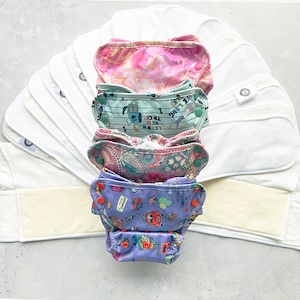
First up, we want to share that cloth diaper laundry is not difficult. Here is a quick reference to a routine that WORKS!
Machine washing:
1. Knock solids (poop) into the toilet and flush.
2. Rinse the insert/soaker well in cold water and hang on the side of a bucket.
3. Collect all the diapers used over 48 hours.
4. Pre-wash the diapers with 1 teaspoon of detergent.
5. Main wash in warm water and a rigorous cycle. Wash time should be at least 30 mins. Use 1-1.5 tablespoons of a strong detergent like Surf/Tide/Ariel.
6. Rinse 2-3 times.
7. Spin dry, no tumble dry.
Hand washing:
1. Knock solids (poop) into the toilet and flush.
2. Rinse the insert/soaker well in cold water and hang on the side of a bucket.
3. Collect all the diapers used over 48 hours.
4. For pre-wash, soak the diapers for 15 mins in water with 1 teaspoon of detergent. Discard the water.
5. For main wash, soak for 30 mins in warm water and 1-1.5 tablespoons of detergent, agitate well for 10 minutes using a plunger. Use a strong detergent like Surf/Tide/Ariel.
6. Rinse 3 times.
7. Dry on a clothes line in your terrace/back yard/balcony.
If you have hard water, add water softener during the main wash cycle above. Check commercially available water softeners such as Blue Oxy or Calgon. Quantity as per recommendations of the water softener.
Now let's get into the details!
In a recent survey conducted by Bumpadum, laundry was identified as the biggest challenge that existing users of cloth diapers faced. It was also quoted as the biggest reason for parents not to move to cloth diapers. So let's bust some myths around laundry!
P.S.: If you want to know what cloth diapers are, have a quick look here!
-------~~~~-------
Myth 1 : You need to do laundry one or more times a day with cloth diapers
Totally unnecessary. There are many cloth diapering parents who do laundry once in 2-3 days, depending on how many cloth diapers they have. Just store used diapers in an open dry bucket or a closed wetbag and you don't need to worry about them until laundry time. Of course, if the diaper is pooped in, make sure to knock the solids into the toilet first and use a health faucet/diaper sprayer to ensure there is no poop left on the diaper.
Myth 2 : Cloth diapers need to be washed by hand to get them totally clean
Again, totally untrue. Cloth diapers can be washed by washing machine or by hand, depending on your preference. They can even be added into a load of regular clothes that are being washed in the machine. In this case, just ensure that you rinse the cloth diapers separately before adding in the remaining clothes.
Myth 3 : Washing cloth diapers is gross/messy
Mess is caused by poopy diapers. Since you flush all poop into the toilet before storing, you do not encounter mess during washing at all.
Now that we have busted some myths, let's talk about the ideal way to wash cloth diapers.
1) What do you do after taking off a diaper?
For poopy diapers, knock the solids into the toilet and flush. Use a diaper sprayer/health faucet (the sprayer next to most western toilets in India) to spray water thoroughly on the inside of the diaper to ensure all poop is washed out. If done right, your hands will remain clean and dry at the end of this process :)
For diapers with just pee, rinse the insert and shell thoroughly in cold water and hang the insert on the sides of a dry open bucket.
If unable to rinse the diaper immediately, store in a closed waterproof wetbag until you can rinse. A wetbag also prevents smells from escaping. Don't forget to rinse at the end of the day.
If you are short on time, you can also collect all the diapers used in a day and rinse them in your washing machine at the end of the day. Run a 10-15 min rinse cycle without any detergent, and hang on the side of a bucket.
2) What do you do before washing?
If you are washing by machine, start with a rinsing cycle (or pre-wash cycle) with a little bit of detergent - this gives a boost to the main wash cycle by starting the process of cleaning.This cycle can be run for 10-15 minutes.
If you are washing by hand, soak in detergent for about 10 mins, agitate and rinse well in cold water. Discard the water used for soaking.
3) How do you wash the diapers?
Essentially, you need to wash the diapers in a way that will leave them thoroughly clean without any remnant pee/detergent on them. Remnant pee will cause the diapers to stink and leave rashes after a few days of use. Remnant detergent will cause the diaper to not absorb well. Use an enzyme-free, fragrance-free detergent in order to preserve the waterproof layer. In India, we recommend using a mainstream detergent such as Surf Excel or Tide Original Unscented.
If you are using the washing machine, choose a cycle meant for cleaning dirty garments, using warm water (not hot). A gentle cycle or the baby sanitary cycle will not be suitable. The washing part of the cycle needs to be at least 30 mins long to ensure clean diapers. Rinsing and spinning time extra.
If you are washing by hand, soak the diapers in fresh water and detergent for 30 mins and then agitate well in the bucket itself with your hand or a plunger. Then take out each diaper, rub well against itself so that it lathers well and then rinse till the water runs clear of detergent suds.
Here are a few guidelines that will help you get the diapers totally clean.
- Detergent: Use enough detergent that you would use for a soiled/very dirty load of regular clothes.
- Warm water: Washing with warm water helps the detergent clean better. The water temperature for regular washing should not exceed 40 degrees Celsius in order to preserve the waterproof layer.
- Rinsing: Ensure you rinse the diapers well after washing to remove any remnant detergent. This may mean adding an extra rinse step in your regular washing cycle.
4) How do you dry the diapers?
Line drying in the sun is best. Sunning also fades away any stains. You can also tumble dry the inserts like regular clothes.
-------~~~~-------
This should cover 99% of all laundry issues you may face. If you have very hard water, you may need a couple of extra guidelines, click here to find out more.
Leave a comment if you have faced any other laundry problems, we would love to help you out!



13 comments
Very nice dipars
Very nice dipars
Very nice dipars
Very nice dipars
Very nice